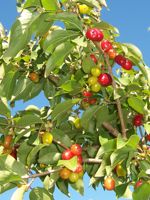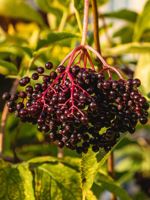Mon-Fri 9am - 5pm Mountain time
Cornelian Cherry Dogwood vs Bob Gordon Elderberry
Cornus mas
Sambucus canadensis Bob Gordon
NOT AVAILABLE THIS SEASON - MIGHT RETURN
Cornelian Cherry Dogwood is an ornamental plant with a variety of uses as it can be grown as a shrub, small tree, hedge, or privacy screen. The bright yellow flowers grow in clusters and bloom in late winter to early spring, providing an early food source for pollinators. They are visually striking as the flowers bloom before the leaves appear and last for several weeks.
Red, cherry-like fruits are produced in midsummer. They are edible but are better suited for preserves and syrups as the taste is fairly sour and astringent, similar to that of sour cherries and cranberries.
The Cornelian Cherry Dogwood was the winner of the Gold Medal Award from The Pennsylvania Horticultural Society as well as the Cary Award for having superior landscape appeal and for being winter hardy and pest resistant.
Bob Gordon Elderberry is a Black Elderberry cultivar that produces berries that are larger and sweeter than other varieties, making it one of the top cultivars. It produces large clusters of white flowers that turn into large clusters of dark purple to black berries. The berries are well-suited for baked goods, jams, jellies, and syrups. It was selected from the wild in Missouri.
The large berry clusters that the Bob Gordon Elderberry produces will often end up hanging downward. This makes it more difficult for birds to feed on the berries. If birds are a concern, this might be the right berry for you.
Black Elderberries are considered to be partially self-pollinating. So while they will still produce some berries without cross-pollination, planting with another variety will increase yields. Consider planting with Black Elderberry or Ranch Elderberry.
Warning: the seeds, stems, leaves, roots, and uncooked berries are toxic to humans when eaten in quantity. Berries should be cooked to make them safe for human consumption.
Cornelian Cherry Dogwood Quick Facts
Bob Gordon Elderberry Quick Facts
Toxicity: leaves, stems, and uncooked berries are poisonous to humans

